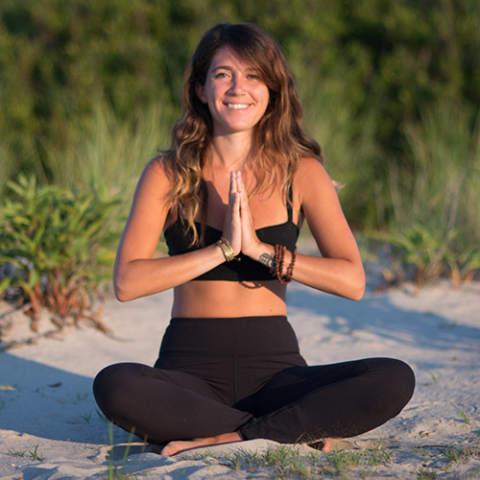“I have committed myself to becoming a liaison between the public health world and the yoga community.
It is my hope that more yoga programs will move into nontraditional settings – such as hospitals, prisons, rehabilitation centers, schools, and community centers – in order to increase access to this healing practice.”

Yoga Journey
Yoga helped me become whole. For years, I struggled with anxiety and placed too much stress on myself. On the outside I always seemed happy; but internally, I was often distracted by worries. For awhile, I was not truly present.
Then, somehow, I found my way into a yoga studio. I am not sure whether it was a little bit of luck or fate; but I made it there. My yoga practice began as a way to quiet my anxious mind and then it transformed itself into so much more. Moving and breathing on the mat helped me let go of everything that was holding me back from being present. Yoga was my catalyst for change.
Recognizing yoga’s healing and transformative powers, I began my teacher training program at Wake Up Yoga, in Philadelphia, so that I could share the practice with others and encourage them to find their own path to presence. After completing my 250-hour foundational studies, I began my yoga therapy certification in order to be able to further empower individuals through the healing practice of yoga. .
Today, my yoga practice and teaching remains a place to connect and to grow. I enjoy learning constantly from this journey, my students and my many teachers along the way.
Educational Journey
I have always been committed to studying health and wellness so that I may empower others to realize their full potential. At Pennsylvania State University, I majored in Food Science with a focus in Nutrition. There, I explored how our food system contributes to our health.
After graduating, I traveled; and as I did, I witnessed, first hand, the health disparities that exist in many of the foreign countries that I went to. Feeling compelled to do something, I volunteered at schools, orphanages and women and children’s health clinics. While I was abroad, I also learned about many different health protective practices that were deeply rooted in the cultures I immersed myself in. I became inspired to somehow use a more traditionally rooted approach to improve wellness.
When I returned to the U.S. from my travels, I enrolled in a Global Health Certificate program at Drexel University. The program was focused on how to be able to respond competently to present international health challenges. Upon completing the Global Health Certificate program at Drexel, I further pursued a Master’s Degree of Public Health (MPH) in order to gain even more experience in designing, implementing and evaluating community-based programs to improve the population’s health and alleviate disparities.
During my MPH studies, I took classes that would help me develop and support public health initiatives that were rooted in more traditional practices including: Integrative Addictions Therapy; Religion, Spirituality, Faith and Health; and Multicultural Competence. I also studied the effects and prevalence of trauma and the current public health crisis that is a result of the experience.
In the first year of my MPH, I serendipitously discovered trauma-informed yoga. This therapeutic style of yoga captivated me and I spent over a year researching and writing my thesis at Drexel on the subject. As a simple, traditional practice with a modern, scientifically based approach it has a tremendous potential to help alleviate the burden of trauma. You can read more about it , and my work, here.
Since undergoing the trauma-informed yoga training and graduating with my MPH, I have committed myself to becoming a liaison between the public health world and the yoga community. It is my hope that yoga programs will move into nontraditional settings – such as hospitals, prisons, rehabilitation centers, schools, and community centers in order to increase access to this healing practice. My Master’s background allows me to advocate for the placement of these yoga programs in a way that is both grounded by research and sustained through comprehensive program design and evaluation.
